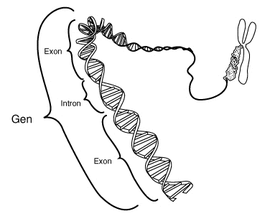Intron
|
|
Exon-intron.jpg
Introns are sections of DNA within a gene that do not encode part of the protein that the gene produces, and are spliced out of the mRNA that is transcribed from the gene before it is exported from the cell nucleus. Introns exist mainly (but not only) in eukaryotic cells. The regions of a gene that remain in the spliced mRNA are called exons.
Introns sometimes allow for alternative splicing of a gene, so that several different proteins that share some sections in common can be produced from a single gene. The control of mRNA splicing, and hence of which alternative is produced, is performed by a wide variety of signal molecules. Introns also sometimes contain "old code," sections of a gene that were probably once translated into protein but which are now discarded.
Some introns such as Group I and Group II introns are actually ribozymes that are capable of catalyzing their own splicing out of the primary RNA transcript. They remove themselves on their own.
The amount of intron DNA varies widely between species. The pufferfish species Fugu rubripes has a very low amount of intron DNA, whereas related species have higher amounts. Introns are not to be confused with junk DNA, which is all DNA without known function that is not part of a gene.
Intron evolution
There are two competing theories as to the evolutionary origin of introns, which is usually studied in a highly conserved family of genes such as the actins. In the introns-early model ancestral genes are believed to have included a large number of introns, some of which have been lost over evolutionary time, leading to the different but similar intron patterns in related genes of different species. The introns-late model suggests instead that introns occur in the same location in variants of a given gene because the location is in some way predisposed to the introduction of an intron, and therefore that a similar intron pattern may arise in two different species by a form of convergent evolution.
See also
Reference
- Walter Gilbert (1978 Feb 9) "Why Genes In Pieces?" Nature 271 (5645):501.
de:Intron es:Intrón he:אינטרון ja:イントロン nl:Intron pl:Intron pt:Intrão

